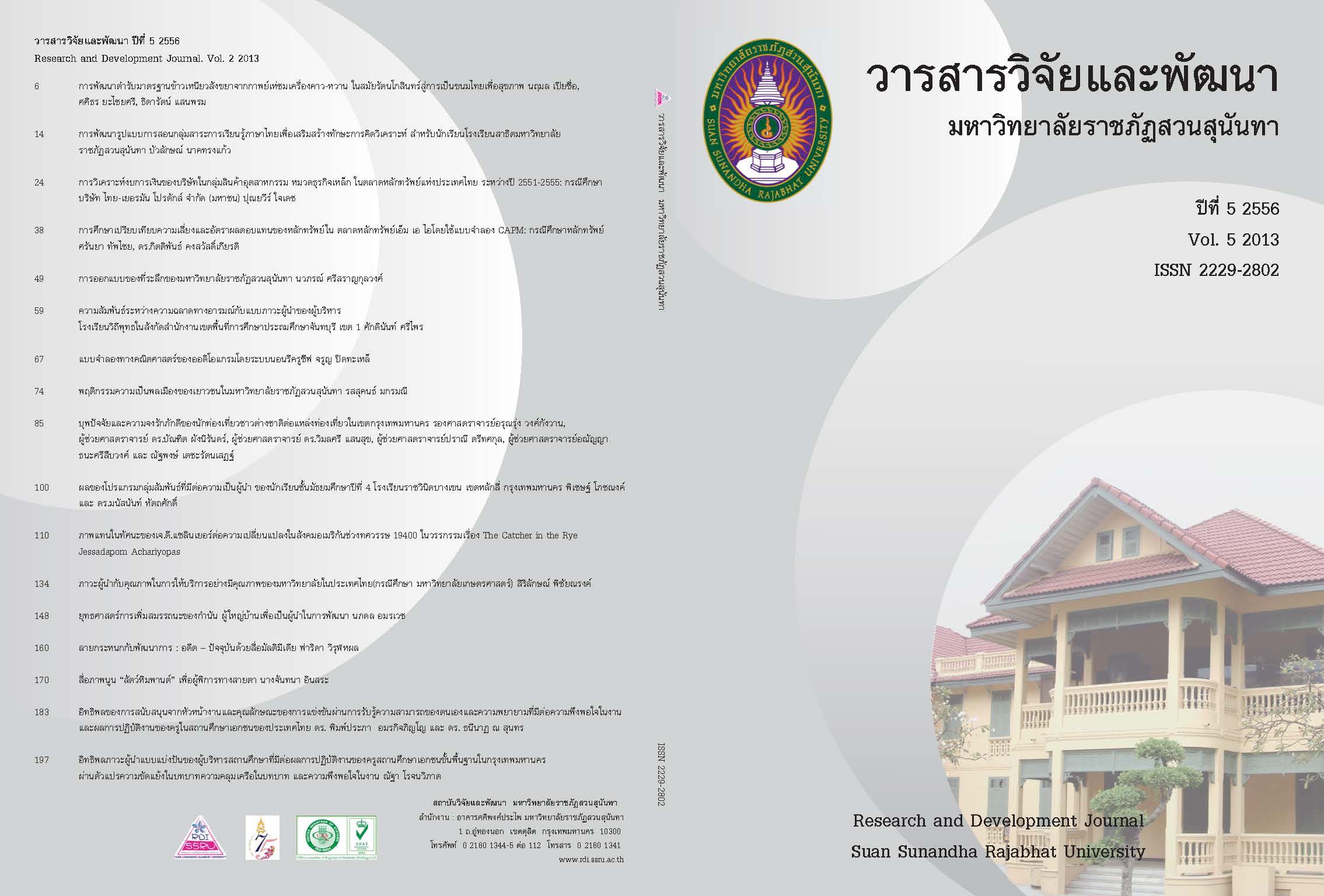ผลของโปรแกรมกลุ่มสัมพันธ์ที่มีต่อความเป็นผู้นา ของนักเรียนชั้นมัธยมศึกษาปีที่ 4 โรงเรียนราชวินิตบางเขน เขตหลักสี่ กรุงเทพมหานคร
DOI:
https://doi.org/10.53848/irdssru.v5i1.214312คำสำคัญ:
-บทคัดย่อ
การวิจัยครั้งนี้มีวัตถุประสงค์ 1) เพื่อเปรียบเทียบภาวะผู้นาของนักเรียนก่อนและหลังที่ไม่ได้รับการจัดกิจกรรมกลุ่มสัมพันธ์ 2) เพื่อเปรียบเทียบภาวะผู้นาของนักเรียนก่อนและหลังการได้รับการจัดกิจกรรมกลุ่มสัมพันธ์ 3) เพื่อเปรียบเทียบภาวะผู้นาของนักเรียนที่ได้รับการจัดกิจกรรมกลุ่มสัมพันธ์กับนักเรียนที่ไม่ได้รับการจัดกิจกรรมกลุ่มสัมพันธ์ 4) เพื่อศึกษาความคิดเห็นของนักเรียนที่มีต่อการเข้าร่วมกิจกรรมกลุ่มสัมพันธ์ และต่อผู้วิจัย งานวิจัยครั้งนี้เป็นการวิจัยกึ่งทดลอง ประชากรคือ นักเรียนระดับชั้นมัธยมศึกษาปีที่ 4 โรงเรียนราชวินิตบางเขน ภาคเรียนที่ 1 ปีการศึกษา 2555 จานวน 500 คน โดยนักเรียนทุกคนทาแบบวัดภาวะผู้นา แล้วคัดเลือกห้องที่มีคะแนนเฉลี่ยจากแบบวัดภาวะผู้นาน้อยที่สุด นามาเรียงคะแนนจากน้อยไปหามาก จากนั้นเลือกนักเรียนที่มีคะแนนน้อยที่สุด 24 คนแรกเป็นกลุ่มตัวอย่าง แบ่งเป็นกลุ่มทดลอง 12 คน และกลุ่มควบคุม 12 คน นักเรียนกลุ่มทดลองเข้าร่วมกิจกรรม 12 ครั้ง ครั้งละ 50 นาที เครื่องมือที่ใช้ในการวิจัย คือ กิจกรรมกลุ่มสัมพันธ์เพื่อพัฒนาและเสริมสร้างภาวะผู้นา แบบวัดภาวะผู้นา แบบบันทึกการเรียนรู้ของนักเรียนที่มีต่อกิจกรรมกลุ่มสัมพันธ์เมื่อเสร็จสิ้นการ
เอกสารอ้างอิง
[2] บุหงา วชิระศักดิ์มงคล. 2542. กิจกรรมกลุ่มใน
โรงเรียน. พิมพ์ครั้งที่ 2. พิษณุโลก: มหาวิทยาลัย
นเรศวร.
[3] ประกอบ คุปรัตน์. 2549. ผู้นาอุดมศึกษาในอนาคต
(Online).http://pracob.blogspot.com/2010/10/
blog-post.html, 15 สิงหาคม 2553.
[4] ปรีชา การสอาด. 2547. การวิเคราะห์องค์ประกอบ
ความรับผิดชอบต่อสังคมของนักเรียนชั้นมัธยมศึกษา
ปีที่ 3 สังกัดสานักงานสามัญศึกษา จังหวัด
มหาสารคาม. การศึกษาค้นคว้าอิสระการศึกษา
มหาบัณฑิต, มหาวิทยาลัยมหาสารคาม.
[5] รังสรรค์ ประเสริฐศรี. 2544. ภาวะผู้นา.
กรุงเทพฯ: ธนธัชการพิมพ์.
[6] สมเกียรติ ถุงแก้ว. 2548. ผลการใช้กิจกรรมกลุ่มที่มี
ต่อความรับผิดชอบต่อสังคมของนักเรียนชั้น
ประถมศึกษาปีที่ 6. วิทยานิพนธ์การศึกษามหาบัณฑิต
สาขาจิตวิทยาการแนะแนว, มหาวิทยาลัยนเรศวร.
[7] สมพงษ์ เกษมสิน. 2535. การบริหารงานบุคคลแผน
ใหม่. กรุงเทพมหานคร: สานักพิมพ์ไทยวัฒนาพานิช.
[8] สุเทพ พงศ์ศรีวัฒน์. 2544. ภาวะผู้นา: ทฤษฎีและ
ปฏิบัติ. เชียงราย: สถาบันราชภัฏเชียงราย.
ดาวน์โหลด
เผยแพร่แล้ว
รูปแบบการอ้างอิง
ฉบับ
ประเภทบทความ
สัญญาอนุญาต
บทความที่ได้รับการตีพิมพ์เป็นลิขสิทธิ์ของ สถาบันวิจัยและพัฒนา มหาวิทยาลัยราชภัฎสวนสุนันทา
ข้อความที่ปรากฏในบทความแต่ละเรื่องในวารสารวิชาการเล่มนี้เป็นความคิดเห็นส่วนตัวของผู้เขียนแต่ละท่านไม่เกี่ยวข้องกับมหาวิทยาลัยราชภัฎสวนสุนันทา และคณาจารย์ท่านอื่นๆในมหาวิทยาลัยฯ แต่อย่างใด ความรับผิดชอบองค์ประกอบทั้งหมดของบทความแต่ละเรื่องเป็นของผู้เขียนแต่ละท่าน หากมีความผิดพลาดใดๆ ผู้เขียนแต่ละท่านจะรับผิดชอบบทความของตนเองแต่ผู้เดียว





